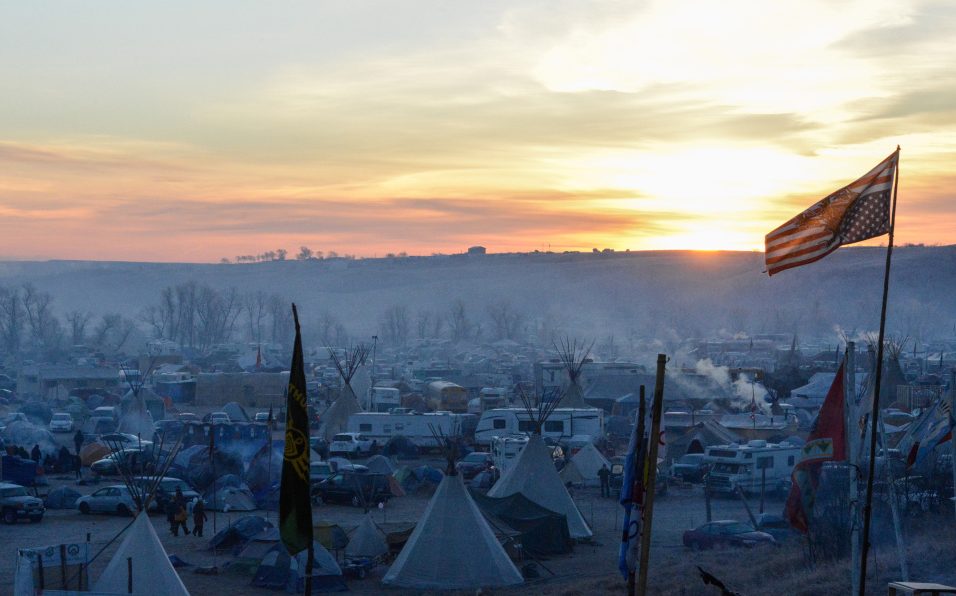“Injustice anywhere is a threat to justice everywhere.”
– Martin Luther King Jr., “Letter from Birmingham Jail,” April 16, 1963
BANGOR — I had to act. When I saw the live Facebook stream of the attack on water protectors near the Standing Rock Sioux reservation, I drove out to North Dakota to stand with them.
Seeing rubber bullets, tear gas, concussion grenades, water hoses and high-tech sonic equipment deployed against citizens peacefully protesting the Dakota Access Pipeline reminded me of footage of Selma, Alabama, in 1965, when unarmed peaceful Freedom Riders were brutally attacked by police. I thought America was done with this type of government-led violence, but racism and the power of money still rule.
When I arrived, I spoke with a member of the Standing Rock Sioux Tribe who was present for the events of Nov. 20 and 21. He recounted the terrible morning when the National Guard and law enforcement fired rubber bullets and sprayed water on campfires that people were using to stay warm, before turning the hoses on the people themselves. The temperature was below freezing; over 300 people were injured, and 26 were hospitalized with injuries including hypothermia.
Thousands showed up over a two-day period prior to eviction day, Dec. 5. Action training was given, a very sobering training on how to protect oneself and look out for the safety of others during actions taken by authorities, water protectors or both. Trainers shared that all communications were being monitored by authorities and that informants for the oil company and law enforcement were known to be in camp.
A news conference made clear that all actions taken by the Standing Rock Sioux water protectors had been done and would be done in a “peaceful and prayerful” manner, in the words of David Archambault II, spokesperson for the tribe.
The national media didn’t turn out in great numbers to cover Standing Rock until the beginning of December. I had tried in vain in Bangor to get the local ABC and CBS affiliates to run stories, but apparently local stations will run only stories that their national affiliates would run. Where have the mainstream media been? Does the color of one’s skin make a difference? Does the power of money?
On Dec. 4, a group of about 200 veterans led by Wesley Clark Jr. gathered at Cannon Ball, North Dakota, just south of the encampment to hear Iraq veteran and U.S. Rep. Tulsi Gabbard of Hawaii thank them for standing in solidarity with the water protectors. When she was finished, Clark emphasized that the Sioux Nation was in charge and the veterans would follow the Sioux Nation’s lead, helping out the people in camp rather than pursuing direct action.
More veterans continued to arrive during the day. A walk was in the works to the area where the barriers and law enforcement on Highway 1806 could be seen when word spread in camp that the easement allowing the pipeline to run under the river had been denied. A great sense of relief and celebration spread throughout the ranks of the veterans and the camp.
How do the actions of our government at Standing Rock apply to Maine? The administration of Gov. LePage is trying to make it easier for mining companies to dig into mountains here in Maine. That will pollute the pristine water in Maine’s lakes and streams.
The actions taken in North Dakota are directly tied to Maine. By standing up for clean water in North Dakota, we stand up for clean water in Maine and other parts of the U.S. If we fail to stand up and speak out for the water protectors, then we are complicit in pulling the triggers that send the rubber bullets or the tear gas into the water protectors.
Martin Luther King Jr. made that very clear. If we do not stand up against the violence against our neighbors, then we condone such violence. If we do not speak out against violence, then our silence speaks loudly for us. So where do you stand? For violence or against violence? For protecting water or polluting water?
In the coming years, water, a necessity of life, will be more valuable than oil. We must stand up for the water protectors and clean water, speak out against violence and take action.
Send questions/comments to the editors.


